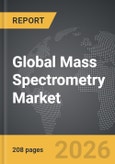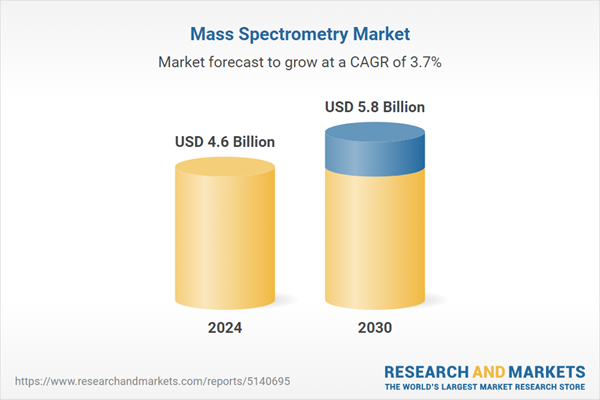Global Mass Spectrometry Market - Key Trends & Drivers Summarized
What Defines Mass Spectrometry and Its Pivotal Role in Modern Science?
Mass spectrometry (MS) stands as a cornerstone analytical technique used to measure the mass-to-charge ratios of ions in a sample, facilitating a detailed analysis of chemical, physical, and biological properties. The method provides critical insights by identifying the amount and types of chemicals present, making it indispensable across a broad range of fields including pharmaceuticals, biotechnology, environmental science, and forensic science. The versatility of MS comes from its ability to perform precise molecular identifications and quantifications, which are crucial for complex analytical tasks such as drug development, biomarker discovery, and environmental monitoring. As technology advances, so does the scope of mass spectrometry applications, now encompassing high-resolution capabilities and tandem MS techniques that allow for multi-faceted analysis and deeper insights into sample compositions.How Are Technological Advancements Revolutionizing Mass Spectrometry?
Recent technological advancements in mass spectrometry are dramatically enhancing its functionality and application range. Key developments include improvements in ionization techniques, which have become more diverse and sensitive, allowing for the analysis of a wider variety of samples under less restrictive conditions. Enhanced detector technologies offer greater sensitivity and faster, more accurate data output. The integration of mass spectrometry with other analytical techniques, such as chromatography, has also significantly improved, exemplified by innovations in liquid chromatography-mass spectrometry (LC-MS) and gas chromatography-mass spectrometry (GC-MS). These hybrid techniques provide powerful tools for the detailed analysis of complex mixtures, essential in research fields requiring precise separation and identification, like metabolomics and proteomics.What Role Does Mass Spectrometry Play Across Various Industries?
Mass spectrometry's impact is substantial and growing across numerous industries. In the pharmaceutical sector, it underpins drug discovery and development processes, facilitating the detailed analysis required for drug characterization, metabolite profiling, and toxicology studies. The environmental sector relies on MS for monitoring pollutants, assessing air, water, and soil samples to detect and quantify trace levels of contaminants, which is crucial for regulatory compliance and environmental protection. In clinical diagnostics, mass spectrometry aids in the rapid and accurate diagnosis of diseases through biomarker detection and is pivotal in the growing field of personalized medicine. Additionally, the food industry utilizes MS to ensure the safety and integrity of products by detecting contaminants and verifying compositions, thus safeguarding public health and complying with global safety standards.What Are the Primary Drivers Behind the Expanding Market for Mass Spectrometry?
The growth in the mass spectrometry market is driven by several factors, indicative of its increasingly essential role across diverse sectors. The continuous advancements in technology that push the limits of detection, accuracy, and speed of analysis are significant growth drivers. There is a surging demand from the biotechnology sector, especially in proteomics and genomics, where MS is critical for studying complex biological systems and processes. Regulatory pressures in pharmaceutical manufacturing, food production, and environmental monitoring also contribute to the market expansion, as these industries require reliable, precise analytical methods to comply with strict quality and safety standards. Furthermore, the integration of MS into clinical settings for diagnostic purposes is growing due to the shift toward more targeted and personalized medical treatments. Collectively, these factors are propelling forward the mass spectrometry market, as they enhance the scope and efficiency of its applications, making it an indispensable tool in scientific research and industrial quality control.Report Scope
The report analyzes the Mass Spectrometry market, presented in terms of market value (USD). The analysis covers the key segments and geographic regions outlined below.- Segments: Platform (Hybrid, Single, Other Platforms); Application (Life Science Research, Drug Discovery, Clinical Diagnostics, Food Testing, Applied Industries, Environmental Testing, Other Applications).
- Geographic Regions/Countries: World; United States; Canada; Japan; China; Europe (France; Germany; Italy; United Kingdom; Spain; Russia; and Rest of Europe); Asia-Pacific (Australia; India; South Korea; and Rest of Asia-Pacific); Latin America (Argentina; Brazil; Mexico; and Rest of Latin America); Middle East (Iran; Israel; Saudi Arabia; United Arab Emirates; and Rest of Middle East); and Africa.
Key Insights:
- Market Growth: Understand the significant growth trajectory of the Hybrid Platform segment, which is expected to reach US$3.7 Billion by 2030 with a CAGR of 4.1%. The Single Platform segment is also set to grow at 3.2% CAGR over the analysis period.
- Regional Analysis: Gain insights into the U.S. market, valued at $1.2 Billion in 2024, and China, forecasted to grow at an impressive 6.4% CAGR to reach $1.2 Billion by 2030. Discover growth trends in other key regions, including Japan, Canada, Germany, and the Asia-Pacific.
Why You Should Buy This Report:
- Detailed Market Analysis: Access a thorough analysis of the Global Mass Spectrometry Market, covering all major geographic regions and market segments.
- Competitive Insights: Get an overview of the competitive landscape, including the market presence of major players across different geographies.
- Future Trends and Drivers: Understand the key trends and drivers shaping the future of the Global Mass Spectrometry Market.
- Actionable Insights: Benefit from actionable insights that can help you identify new revenue opportunities and make strategic business decisions.
Key Questions Answered:
- How is the Global Mass Spectrometry Market expected to evolve by 2030?
- What are the main drivers and restraints affecting the market?
- Which market segments will grow the most over the forecast period?
- How will market shares for different regions and segments change by 2030?
- Who are the leading players in the market, and what are their prospects?
Report Features:
- Comprehensive Market Data: Independent analysis of annual sales and market forecasts in US$ Million from 2024 to 2030.
- In-Depth Regional Analysis: Detailed insights into key markets, including the U.S., China, Japan, Canada, Europe, Asia-Pacific, Latin America, Middle East, and Africa.
- Company Profiles: Coverage of players such as Agilent Technologies, Inc., Analytik Jena AG, Bruker Corporation, DANI Instruments SpA, Hiden Analytical Ltd. and more.
- Complimentary Updates: Receive free report updates for one year to keep you informed of the latest market developments.
Some of the 12 companies featured in this Mass Spectrometry market report include:
- Agilent Technologies, Inc.
- Analytik Jena AG
- Bruker Corporation
- DANI Instruments SpA
- Hiden Analytical Ltd.
- JEOL Ltd.
- Leco Corporation
- PerkinElmer, Inc.
- Rigaku Europe SE
- SCIEX
- Shimadzu Corporation
- Thermo Fisher Scientific, Inc.
- Waters Corporation
This edition integrates the latest global trade and economic shifts into comprehensive market analysis. Key updates include:
- Tariff and Trade Impact: Insights into global tariff negotiations across 180+ countries, with analysis of supply chain turbulence, sourcing disruptions, and geographic realignment. Special focus on 2025 as a pivotal year for trade tensions, including updated perspectives on the Trump-era tariffs.
- Adjusted Forecasts and Analytics: Revised global and regional market forecasts through 2030, incorporating tariff effects, economic uncertainty, and structural changes in globalization. Includes historical analysis from 2015 to 2023.
- Strategic Market Dynamics: Evaluation of revised market prospects, regional outlooks, and key economic indicators such as population and urbanization trends.
- Innovation & Technology Trends: Latest developments in product and process innovation, emerging technologies, and key industry drivers shaping the competitive landscape.
- Competitive Intelligence: Updated global market share estimates for 2025, competitive positioning of major players (Strong/Active/Niche/Trivial), and refined focus on leading global brands and core players.
- Expert Insight & Commentary: Strategic analysis from economists, trade experts, and domain specialists to contextualize market shifts and identify emerging opportunities.
Table of Contents
Companies Mentioned (Partial List)
A selection of companies mentioned in this report includes, but is not limited to:
- Agilent Technologies, Inc.
- Analytik Jena AG
- Bruker Corporation
- DANI Instruments SpA
- Hiden Analytical Ltd.
- JEOL Ltd.
- Leco Corporation
- PerkinElmer, Inc.
- Rigaku Europe SE
- SCIEX
- Shimadzu Corporation
- Thermo Fisher Scientific, Inc.
- Waters Corporation
Table Information
| Report Attribute | Details |
|---|---|
| No. of Pages | 208 |
| Published | February 2026 |
| Forecast Period | 2024 - 2030 |
| Estimated Market Value ( USD | $ 4.6 Billion |
| Forecasted Market Value ( USD | $ 5.8 Billion |
| Compound Annual Growth Rate | 3.7% |
| Regions Covered | Global |









